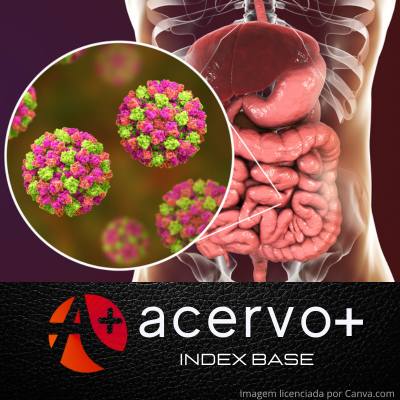Como o microbioma intestinal influencia o stress em adultos
##plugins.themes.bootstrap3.article.main##
Resumo
Objetivo: Investigar como a microbiota intestinal influencia a resposta ao estresse em adultos. Métodos: Trata-se uma revisão integrativa da literatura, com artigos publicados nos últimos 5 anos, de livre acesso. Adotou-se a estratégia PICo: P: adultos, I: stress, Co: microbioma intestinal; e definiu-se a questão norteadora: Como o microbioma intestinal influencia o stress em adultos? A pesquisa foi feita nas bases de dados: LILACS, PubMed e Web of Science e levou a 85 resultados por meio do uso dos Descritores em Ciências da Saúde (DeCS): adults, stress, gastrointestinal microbiome, realizando combinações com os termos com o uso do operador booleano “AND”. Resultados: Foram selecionados 15 artigos que atenderam aos critérios de inclusão e exclusão, evidenciando a participação do microbioma intestinal na regulação da resposta ao estresse por meio do eixo intestino-cérebro, a influência do eixo hipotálamo-hipófise-adrenal e o efeito benéfico da suplementação com probióticos e prebióticos na redução do estresse e da inflamação sistêmica. Considerações finais: O microbioma intestinal é um importante modulador da resposta ao estresse em adultos, configurando-se como um alvo promissor para intervenções que melhorem a qualidade de vida em vários aspectos, como sono e saúde mental, e pode ser modulado por diferentes metodologias e resultados.
##plugins.themes.bootstrap3.article.details##
Copyright © | Todos os direitos reservados.
A revista detém os direitos autorais exclusivos de publicação deste artigo nos termos da lei 9610/98.
Reprodução parcial
É livre o uso de partes do texto, figuras e questionário do artigo, sendo obrigatória a citação dos autores e revista.
Reprodução total
É expressamente proibida, devendo ser autorizada pela revista.
Referências
2. BLOEMENDAAL M, et al. Probiotics-induced changes in gut microbial composition and its effects on cognitive performance after stress: exploratory analyses. Translational Psychiatry, 2021; 11.
3. DALILE B, et al. Colon-delivered short-chain fatty acids attenuate the cortisol response to psychosocial stress in healthy men: a randomized, placebo-controlled trial. Neuropsychopharmacology: Official Publication of the American College of Neuropsychopharmacology, 2020; 45(13): 2257–2266.
4. DALILE B, et al. Colonic butyrate administration modulates fear memory but not the acute stress response in men: A randomized, triple-blind, placebo-controlled trial. Progress in neuro-psychopharmacology & biological psychiatry, 2024; 131: 110939.
5. KIM C-S, et al. Probiotic supplementation improves cognitive function and mood with changes in gut microbiota in community-dwelling elderly: A randomized, double-blind, placebo-controlled, multicenter trial. The Journals of Gerontology: Series A, 2020; 76(1): 32–40.
6. LEYROLLE Q, et al. Prebiotic effect on mood in obese patients is determined by the initial gut microbiota composition: A randomized, controlled trial. Brain, Behavior, and Immunity, 2021; 94: 289–298.
7. LOBO B, et al. The Stressed Gut: Region-specific Immune and Neuroplasticity Changes in Response to Chronic Psychosocial Stress. Journal of Neurogastroenterology and Motility, 2023; 29(1): 72–84.
8. LOPRESTI AL, et al. Efficacy of a curcumin extract (CurcugenTM) on gastrointestinal symptoms and intestinal microbiota in adults with self-reported digestive complaints: a randomised, double-blind, placebo-controlled study. BMC Complementary Medicine and Therapies, 2021; 21(1).
9. MÄKELÄ SM, et al. Efficacy and safety of Lacticaseibacillus paracasei Lpc-37® in students facing examination stress: A randomized, triple-blind, placebo-controlled clinical trial (the ChillEx study). Brain, Behavior, & Immunity - Health, 2023; 32: 100673.
10. MÁRQUEZ-MORALES L, et al. Effect of the Intake of a Traditional Mexican Beverage Fermented with Lactic Acid Bacteria on Academic Stress in Medical Students. Nutrients, 2021; 13(5): 1551.
11. MYSONHIMER AR, et al. Prebiotic Consumption Alters Microbiota but Not Biological Markers of Stress and Inflammation or Mental Health Symptoms in Healthy Adults: A Randomized, Controlled, Crossover Trial. Journal of Nutrition, 2023; 153(4): 1283–1296.
12. ÖNNING G, et al. Intake of Lactiplantibacillus plantarum HEAL9 reduces the inflammatory markers soluble fractalkine and CD163 during acute stress: A randomized, double blind, placebo-controlled study. Physiology & Behavior, 2020; 225: 113083.
13. SANTAMARINA AB, et al. Nutraceutical Capsules LL1 and Silymarin Supplementation Act on Mood and Sleep Quality Perception by Microbiota–Gut–Brain Axis: A Pilot Clinical Study. Nutrients, 2024; 16(18): 3049–3049.
14. SLYKERMAN RF, LI E. A randomized trial of probiotic supplementation in nurses to reduce stress and viral illness. Scientific Reports, 2022; 12(1): 14742.
15. WEST NP, et al. Probiotic supplementation for respiratory and gastrointestinal illness symptoms in healthy physically active individuals. Clinical Nutrition, 2021; 33(4): 581–587.

